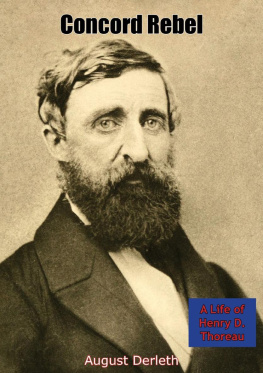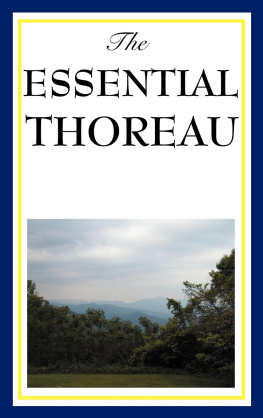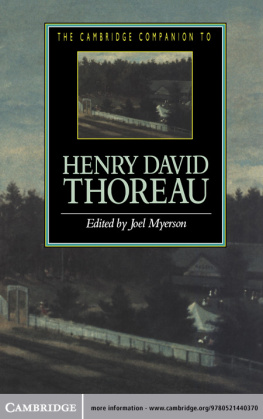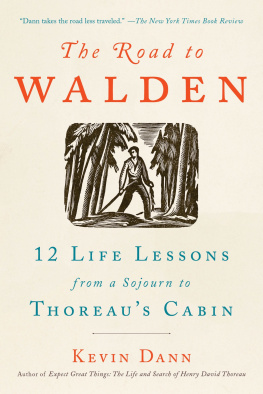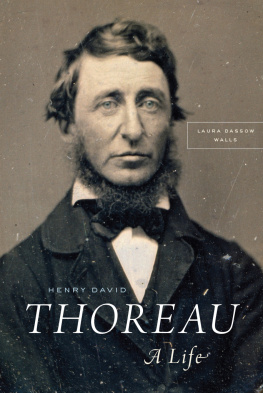This edition is published by Papamoa Press www.pp-publishing.com
To join our mailing list for new titles or for issues with our books papamoapress@gmail.com
Or on Facebook
Text originally published in 1962 under the same title.
Papamoa Press 2018, all rights reserved. No part of this publication may be reproduced, stored in a retrieval system or transmitted by any means, electrical, mechanical or otherwise without the written permission of the copyright holder.
Publishers Note
Although in most cases we have retained the Authors original spelling and grammar to authentically reproduce the work of the Author and the original intent of such material, some additional notes and clarifications have been added for the modern readers benefit.
We have also made every effort to include all maps and illustrations of the original edition the limitations of formatting do not allow of including larger maps, we will upload as many of these maps as possible.
CONCORD REBEL
A LIFE OF HENRY D. THOREAU
BY
AUGUST DERLETH
TABLE OF CONTENTS
Contents
TABLE OF CONTENTS
DEDICATION
For
WALTER HARDING
who has earned the gratitude of Thoreauvians
throughout the world...
FOREWORD
The single business of Henry Thoreau, during forty-odd years of eager activity, was to discover an economy calculated to provide a satisfying life.
VERNON L. PARRINGTON
Main Currents in American Thought
IT is seldom in the history of mankind that a writer, generally ignored in his lifetimeone whose work has been dismissed by critics and largely gone unread by the public in his own timeshould achieve many years after his death an eminent place among the leading writers of his country and among the most influential writers in the world.
Henry David Thoreau was such a writer.
Yet Thoreau was a rebel against the commonly held social credos of his time, a profoundly religious man who; had signed off, as he put it, from his church, a rigid disciplinarian and believer in order who had denied the authority of the state, a poet whose preferred medium of expression was prose, an exponent of freedom of thought in a society which followed the contemporary patterns in popular thoughtand valued what Thoreau scornedmaterial success.
His work is the testament of his rebellion, from Walden, which has become the companion of thousands, to Civil Disobedience, which was the inspiration of Mahatma Gandhi and other liberal leaders throughout the world.
His life was not one of physical action, but of adventure in the domain of his mind. He found his occasions in himself, as he said, and in so doing he achieved the distinction of being the only man of leisure in Concord, Massachusetts, because the work he did was less visible to his fellow-citizens than the labor of a ditch-digger. Writing was his business, he said, and he walked abroad in the environs of his native place to see what I have caught in my traps, which I set for facts.
Thoreaus vision is one which ought to make an irresistible appeal to the young. No mentally alive young man or woman can read Walden and come away from it willing to accept readily the common conventions of the world or the shabby goals set for the mass of men by their materialistic society. The cost of a thing is the amount of what I call life which is required to be exchanged for it, he wrote, and he went his way through life determined to exact the most from every moment at the least cost in living, and this, despite his limitationsfor he was a bachelor, and he made his sacrifices only for himself, which is considerably easier than making sacrifices which might involve dependents in deprivationshe did.
ACKNOWLEDGMENT
GRATEFUL acknowledgment is made to Houghton Mifflin Company, as the authorized publishers of the works of Henry D. Thoreau, for permission to quote at will from The Writings of Henry D. Thoreau; and to the New York University Press, for permission to do likewise from The Correspondence of Henry D. Thoreau, edited by Walter Harding and Carl Bode, as well as to the owners of previously unpublished letters appearing for the first time in that book.
CHAPTER 1If I Knew How It Began...
I came into this world, not chiefly to make this a good place to live in, but to live in it, be it good or bad. WALDEN
THERE was little in Henry David Thoreaus background and youth to foretell his course in life. He was born July 12, 1817, at his Grandmother Minotts farm on the old Virginia road not far outside Concord, of French-Huguenot and Scottish-Quaker ancestry. When he was baptized three months later by Dr. Ezra Ripley, the leading divine of Concord, he was named David Henry Thoreau, and so he was called until he chose to reverse his given names when he was twenty, at about the time he was graduated from Harvard.
His father was John Thoreau, born in 1787 in Boston. His mother was Cynthia Dunbar, born in the same year in Keene, New Hampshire, the daughter of the Reverend Asa Dunbar. Henry had an older sister, Helen, an older brother, John, and was yet to have a younger sister, Sophia. His father, following the family tradition, had learned storekeeping in Salem and Concord before going into business on borrowed money. He had failed in business, and at the time of Henrys birth the family was quite poor even by the standards of 1817.
Thoreaus earliest years were unsettled because of his fathers attempts to establish himself. His father tried his hand at various enterprises. For a while he farmed for his mother-in-law, but he was ill-suited to farming. He next tried keeping a store at Chelmsford, but he failed at this, too, and he turned to keeping a school in Boston, but he had little talent for teaching. He then tried to become a salesman, directing his attention to the Indians who were still to be found in various places throughout New England. This proved so unrewarding that finally, in 1823, when Henry was six, he moved back to Concord and set himself up as a pencil-maker, at which he presently made a modest success.
The Thoreaus were a closely-knit family of lifelong duration. John was a relatively grave man who said very little. He stood somewhat shorter than his wife, and had a tendency toward deafness. He was not prepossessing, but likable, and was far more studious than his wife. Mrs. Thoreau was lively and bustling, with an inclination toward gayety. She was a kindly, shrewd woman, who could sometimes make sharp observations about her fellow-citizens, though she was not in any sense mean and she was very much liked. She loved to talk, and soon had the reputation of being the biggest talker in all Concord. She was also a great reader, much given to sentiment and emotion, and capable of very strong opinions, particularly on such subjects as slavery, to which she was strongly opposed.
Concord was at this timeand remained for most of Thoreaus lifea village of something less than two thousand inhabitants, though the country men who lived in the surrounding township of Concord brought the total population to a little over that figure. It was a typical New England village, one of tree-naved streets lined with white painted housesas well as some which were not painted at all. There was a village square just past rows of shops put up on a one-time mill dam along a brook. It was a village weighted with ministers at the one end of the social scale, and tavern-keepers at the other. Its most substantial citizens during most of Thoreaus life were Samuel Hoar, the lawyer who owned the most imposing house in the village, and the Reverend Ezra Ripley, pastor of Concords First Parish, Congregational.

